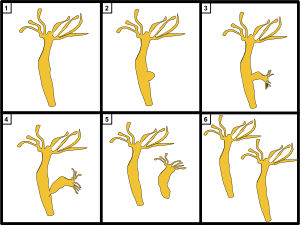Budding
In hydra, a bud develops as an outgrowth due to repeated cell division of the parent body at one specific site.
Internal budding or endodyogeny is a process of asexual reproduction, favored by parasites such as Toxoplasma gondii.
Some cells divide asymmetrically by budding, for example Saccharomyces cerevisiae, the yeast species used in baking and brewing.
Animals that reproduce by budding include corals, some sponges, some acoels (e.g., Convolutriloba), echinoderm larvae, placozoans, symbions, pterobranchians, entoproctans, some polychaetes, bryozoans, tunicates, flatworms and a single phoronid species.
Colonies of some bee species have also exhibited budding behavior, such as Apis dorsata.


